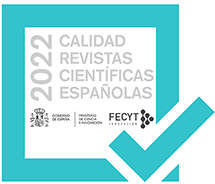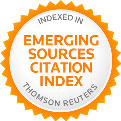El soporte de autonomía en Educación Física como medio de prevención de la oposición desafiante del alumnado. [Autonomy support in Physical Education as a means of preventing students’ oppositional defiance].
Resumen
La ausencia del apoyo a la autonomía creado por el docente de Educación Física (EF) puede desencadenar en el alumnado conductas desinteresadas e indisciplinadas. Así, bajo el sustento de la teoría de la autodeterminación el objetivo del estudio fue testar un modelo que relacionaba el apoyo a la autonomía del profesorado de EF con la percepción de satisfacción y frustración de dicha necesidad, así como con la conducta de oposición desafiante del alumnado en las clases de EF. En el estudio participaron 196 alumnos (M edad = 13.32; DT = 1.38), 95 varones y 101 mujeres, pertenecientes al primer ciclo de Educación Secundaria Obligatoria, quiénes cumplimentaron los factores de autonomía de los siguientes cuestionarios: Cuestionario de Apoyo a las Necesidades Psicológicas Básicas (CANPB), la Escala de Medición de las Necesidades Psicológicas Básicas (BPNES) y la Escala de Frustración de las Necesidades Psicológicas (EFNP). Además se midió la oposición desafiante con una escala adaptada a la EF. El análisis de los resultados evidenció la importancia del apoyo a la autonomía para satisfacer y evitar la frustración de ésta. De igual modo, la frustración de la autonomía se configura como una variable influyente sobre la oposición desafiante. Estos hallazgos suscitan la necesidad de crear un clima orientado al apoyo a la autonomía en EF, alejado de un estilo más controlador, evitando de este modo la frustración de la autonomía en el aula y previniendo de esta manera las conductas desafiantes del alumnado.
Abstract
The lack of autonomy support created by the Physical Education (PE) teacher can trigger disinterested and undisciplined behaviors in students. Grounded in Self-Determination Theory, this study tested an integrated model that related autonomy supportive teaching with autonomy satisfaction and autonomy frustration, as well as oppositional defiance of PE students. 196 students (age = 13.32, SD = 1.38), 95 men and 101 women, from the first cycle of secondary school, answered the following questionnaires: Questionnaire to assess support of basic psychological needs (Spanish acronym CANPB), Basic Psychological Need Scale (BPNS) and Psychological Need Thwarting Scale (PNTS). For these questionnaires, only the items of autonomy factor were measured. Besides Oppositional Defiance was measured using a scale adapted to the PE. The results showed the importance of autonomy supportive teaching to satisfy autonomy and avoid this need frustration. Similarly, autonomy frustration is established as an influential variable on oppositional defiance. These findings raise the need to create an autonomy support climate in PE, away from a control teaching, to avoid autonomy frustration in the classroom and to prevent defiance behaviors of students.
http://dx.doi.org/10.5232/ricyde2016.04304
Referencias/references
Aelterman, N.; Vansteenkiste, M.; Van den Berghe, L.; De Meyer, J., & Haerens, L. (2014). Fostering a need-supportive teaching style: Intervention effects on physical education teachers' beliefs and teaching behaviors. Journal of Sport & Exercise Psychology, 36(6), 595-609.
http://dx.doi.org/10.1123/jsep.2013-0229
Bartholomew, K. J.; Ntoumanis, N.; Cuevas, R., & Lonsdale, C. (2014). Job pressure and ill-health in physical education teachers: the mediating role of psychological need thwarting. Teaching and Teacher Education, 37(0), 101-107.
http://dx.doi.org/10.1016/ j.tate.2013.10.006
Bartholomew, K. J.; Ntoumanis, N.; Ryan, R. M., & Thøgersen-Ntoumani, C. (2011). Psychological need thwarting in the sport context: assessing the darker side of athletic experience. Journal of Sport & Exercise Psychology, 33, 75-102.
Bartholomew, K. J.; Ntoumanis, N.; Ryan, R. M.; Bosch, J. A., & Thøgersen-Ntoumani, C. (2011). Self-determination theory and diminished functioning: The role of interpersonal control and psychological need thwarting. Personality and Social Psychology Bulletin, 37, 1459-1473.
http://dx.doi.org/10.1177/0146167211413125
Chatzisarantis, N. L. D., & Hagger, M. (2009). Effects of an intervention based on self-determination theory on self-reported leisure-time physical activity participation. Psychology and Health, 24, 29-48.
http://dx.doi.org/10.1080/08870440701809533
Cheon, S. H.; Reeve, J., & Moon, I. S. (2012). Experimentally based, longitudinally designed, teacher-focused intervention to help physical education teachers be more autonomy supportive toward their students. Journal of Sport and Exercise Psychology, 34, 365-396.
Cheon, S. H.; Reeve, J.; Yu, T. H., & Jang, H. R. (2014). The teacher benefits from giving autonomy support during physical education instruction. Journal of Sport & Exercise Psychology, 36(4), 331-346.
http://dx.doi.org/10.1123/jsep.2013-0231
De Meyer, J.; Tallir, I. B.; Soenens, B.; Vansteenkiste, M.; Aelterman, N.; Van den Berghe, L., . . . Haerens, L. (2014). Does observed controlling teaching behavior relate to students’ motivation in physical education? Journal of Educational Psychology, 106(2), 541-554.
http://dx.doi.org/10.1037/a0034399
Deci, E. L., & Ryan, R. M. (2000). The “what” and “why” of goal pursuits: Human needs and the self-determination of behavior. Psychological Inquiry, 11(4), 227-268.
http://dx.doi.org/10.1207/s15327965pli1104_01
Declaración de Helsinki de la Asociación Médica Mundial. (2008). Principios éticos para las investigaciones médicas en seres humanos. Recuperado de:
p://www.wma.net/s/ethicsunit/helsinki.htm
González-Cutre, D.; Ferriz, R.; Beltrán-Carrillo, V. J.; Andrés-Fabra, J. A.; Montero- Carretero, C.; Cervelló, E., & Moreno-Murcia, J. A. (2014). Promotion of autonomy for participation in physical activity: a study based on the transcontextual model of motivation. Educational Psychology, 34, 1-18.
http://dx.doi.org/10.1080/01443410.2013.817325
González-Cutre, D.; Sicilia, A.; Beas-Jiménez, M., & Hagger, M. S. (2014). Broadening the trans-contextual model of motivation: A study with Spanish adolescents. Scandinavian Journal of Medicine and Science in Sports, 24, 306-319.
http://dx.doi.org/10.1111/sms.12142
Haerens, L.; Aelterman, N.; Vansteenkiste, M.; Soenens, B., & Van Petegem, S. (2015). Do perceived autonomy-supportive and controlling teaching relate to physical education students’ motivational experiences through unique pathways? distinguishing between the bright and dark side of motivation. Psychology of Sport and Exercise, 16(3), 26-36.
http://dx.doi.org/10.1016/j.psychsport.2014.08.013
Haerens, L.; Kirk, D.; Cardon, G.; De Bourdeaudhuij, I., & Vansteenkiste, M. (2010). Motivational profiles for secondary school physical education and its relationship to the adoption of a physically active lifestyle among university students. European Physical Education Review, 16, 117-139.
Hambleton, R. K. (2005). Issues, designs and technical guidelines for adapting tests into multiple languages and cultures. En R. K. Hambleton, P. F. Merenda & S. D. Spielberger (eds.): Adapting educational and psychological tests for cross-cultural assessment (pp. 3-38). New Jersey: Lawrence Erlbaum Associates.
Hein, V.; Koka, A., & Hagger, M. S. (2015). Relationships between perceived teachers' controlling behaviour, psychological need thwarting, anger and bullying behaviour in high-school students. Journal of Adolescence, 42, 103-114.
http://dx.doi.org/10.1016/j.adolescence.2015.04.003
Hu, L., & Bentler, P. M. (1999). Cutoff criterion for fit indexes in covariance structure analysis: Conventional criteria versus new alternatives. Structural Equation Modeling, 6(1), 1-55.
Koka, A. (2014). The relative roles of teachers and peers on students' motivation in physical education and its relationship to self-esteem and health-related quality of life. International Journal of Sport Psychology, 45(3), 187-213.
Leptokaridou, E. T.; Vlachopoulos, S. P., & Papaioannou, A. G. (2014). Experimental longitudinal test of the influence of autonomy-supportive teaching on motivation for participation in elementary school physical education. Educational Psychology.
http://dx.doi.org/10.1080/01443410.2014.950195
Lleras, C. (2005). Path analysis. In K. Kempf-Leonard (Ed), The Encyclopedia of Social Measurement. (pp. 25-30). New York: Academy Press.
Moreno-Murcia, J. A.; Conde, C., & Sáenz-López, P. (2012). Importancia del apoyo de autonomía en la figura del docente en educación física. Tándem, 40, 18-27.
Moreno, B.; Jiménez, R.; Gil, A.; Aspano, M., & Torrero, F. (2011). Análisis de la percepción del clima motivacional, necesidades psicológicas básicas, motivación autodeterminada y conductas de disciplina de estudiantes adolescentes en las clases de educación física. Motricidad: Revista De Ciencias De La Actividad Física y Del Deporte, 26, 1-24.
Moreno, J. A.; González-Cutre, D.; Chillón, M., & Parra, N. (2008). Adaptación a la educación física de la Escala de las Necesidades Psicológicas Básicas en el Ejercicio (BPNES). Revista Mexicana de Psicología, 25(2), 295-303.
Núñez, J. L.; Fernández, C.; León, J., & Grijalvo, F. (2015). The relationship between teacher’s autonomy support and students’ autonomy and vitality. Teachers and Teaching, theory and practice, 21(2), 191-202.
http://dx.doi.org/10.1080/13540602.2014.928127
O’Learly, N. (2014). Learning informally to use teaching games for understanding: the experiences of a recently qualified teacher. European Physical Education Review, 20(3), 367-384.
http://dx.doi.org/10.1177/1356336X14534359
Orden de 9 de mayo de 2007, del Departamento de Educación, Cultura y Deporte, por la que se aprueba el currículo de la Educación secundaria obligatoria y se autoriza su aplicación en los centros docentes de la Comunidad autónoma de Aragón. Boletín Oficial de Aragón de 1 de junio de 2007, 65, 8871-9024.
Reeve, J., & Tseng, C. M. (2011). Cortisol reactivity to a teacher’s motivating style: The biology of being controlled versus supporting autonomy. Motivation and Emotion, 35, 63–74.
http://dx.doi.org/10.1007/s11031-011-9204-2
Reeve, J.; Jang, H.; Carrell, H.; Jeon, S., & Barch, J. (2004). Enhancing students’ engagement by increasing teachers’ autonomy support. Motivation and Emotion, 28(2), 147-169.
http://dx.doi.org/10.1023/B:MOEM.0000032312.95499.6f
Reeve, J.; Ryan, R. M.; Deci, E. L., & Jang, H. (2007). Understanding and promoting autonomous self-regulation: A self-determination theory perspective. In D. Schunk & B. Zimmerman (Eds.), Motivation and self-regulated learning: Theory, research, and application (pp. 223–244). Mahwah, N.J.: Lawrence Erlbaum Associates.
Reeve, J.; Vansteenkiste, M.; Assor, A.; Ahmad, I.; Cheon, S. H.; Jang, H.;…Wang, C. K. J. (2014). The beliefs that underlie autonomy-supportive and controlling teaching: A multinational investigation. Motivation and Emotion, 38(1), 93-110.
http://dx.doi.org/10.1521/jscp.1988.6.3-4.293
Ryan, R. M., & Deci, E. L. (2007). Active human nature: Self-determination theory and the promotion and maintenance of sport, exercise, and health. In M. S. Hagger & N. Chatzisarantis (Eds.), Intrinsic motivation and self-determination in exercise and sport (pp. 143–152). Champaign, IL: Human Kinetics.
Sánchez-Oliva, D.; Leo, F.; Amado, D.; Cuevas, R., & García-Calvo, T. (2013). Desarrollo y validación del cuestionario de apoyo a las necesidades psicológicas básicas en educación física. Motricidad: European Journal of Human Movement, 30, 53-71.
Su, Y., & Reeve, J. (2011). A meta-analysis of the effectiveness of intervention programs designed to support autonomy. Educational Psychology Review, 23,159-188.
http://dx.doi.org/10.1007/s10648-010-9142-7
Taylor, I. M., & Ntoumanis, N. (2007). Teacher motivational strategies and student Self- Determination in physical education. Journal of Educational Psychology, 99, 747–760.
http://dx.doi.org/10.1037/0022-0663.99.4.747
Taylor, I.; Ntoumanis, N., & Smith, B. (2009). The social context as a determinant of teacher motivational strategies in physical education. Psychology of Sport and Exercise, 19, 235-243.
http://dx.doi.org/10.1016/j.psychsport.2008.09.002
Van den Berghe, L.; Vansteenkiste, M.; Cardon, G.; Kirk, D., & Haerens, L. (2014). Research on self-determination in physical education: key findings and proposals for future research. Physical Education and Sport Pedagogy, 19(1), 97-121.
http://dx.doi.org/10.1080/17408989.2012.732563
Van Petegem, S.; Vansteenkiste, M.; Soenens, B.; Beyers, W., & Aelterman, N. (2015). Examining the longitudinal association between oppositional defiance and autonomy in adolescence. Developmental Psychology, 51(1), 67.
http://dx.doi.org/10.1037/a0038374
Vansteenkiste, M., & Ryan, R. M. (2013). On psychological growth and vulnerability: basic psychological need satisfaction and need frustration as a unifying principle. Journal of Psychotherapy Integration, 23, 263-280.
http://dx.doi.org/10.1037/a0032359
Vansteenkiste, M.; Soenens, B.; Van Petegem, S., & Duriez, B. (2014). Longitudinal associations between adolescent perceived style of parental prohibition and oppositional defiance and internalization. Developmental Psychology, 50, 229-236.
http://dx.doi.org/10.1037/a0032972
Vlachopoulos, S. P., & Michailidou, S. (2006). Development and initial validation of a measure of autonomy, competence, and relatedness in exercise: The Basic Psychological Needs in Exercise Scale. Measurement in Physical Education and Exercise Science, 10, 179-201.
http://dx.doi.org/10.1207/s15327841mpee10034.
Palabras clave/key words
Texto completo/Full Text:
PDF------------------------ 0 -------------------------
RICYDE. Revista Internacional de Ciencias del Deporte
![]()

Publisher: Ramón Cantó Alcaraz
ISSN:1885-3137 - Periodicidad Trimestral / Quarterly

